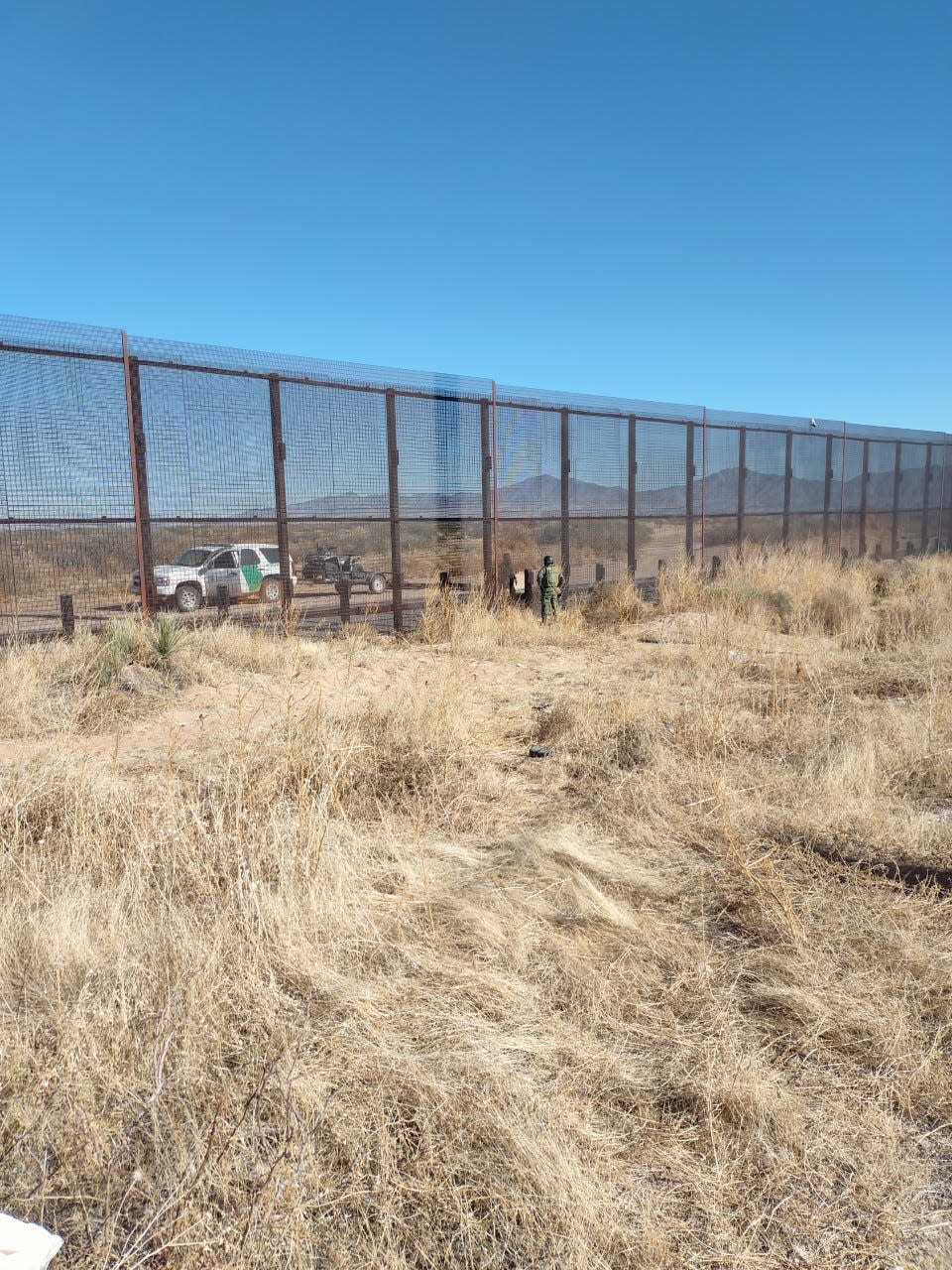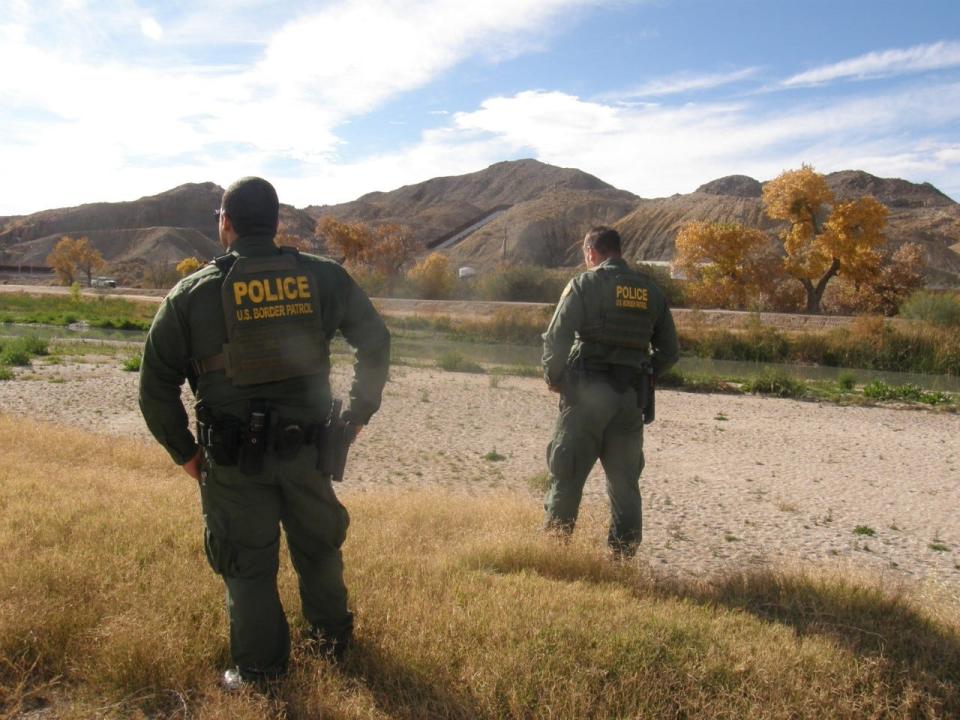Lujan Grisham's challengers for governor examine border through law enforcement lens
- Oops!Something went wrong.Please try again later.
New Mexico Republican primary voters who have not voted early or absentee can vote on June 7 to select the candidate they hope will make Democrat Gov. Michelle Lujan Grisham a one-term governor.
That candidate will also compete with Karen Bedonie of the Libertarian Party, which has major party status in the state.
Although a recent Albuquerque Journal poll shows GOP candidate Mark Ronchetti with a daunting lead over his four rivals for the nomination based on a sample of 560 likely voters, a small percentage of the poll's sample had already completed their ballots.
The one televised debate among the five Republican candidates was broadcast May 20 on KOAT-TV. The debate took place via Zoom, co-anchor Doug Fernandez announced, because visitors to KOAT's studio must be vaccinated against COVID-19, implying that at least one of the candidates was either unvaccinated or did not verify their status.
While the primary is hotly contested among the five candidates presenting themselves for the role of New Mexico's next governor, they share a consensus that the southern border is an urgent priority, although they tend to approach it primarily as a security issue.

For example, Rebecca Dow, a state Representative from Truth or Consequences, opened the KOAT debate by declaring Lujan Grisham "has opened our border to the criminal elements of the cartel. They're trafficking humans, smuggling drugs and they're responsible for the abuse of countless women and children. And that's why Republicans are picking the next governor on June 7."
New Mexico's border with Chihuahua, Mexico, presents a dynamic mix of security, humanitarian and economic development concerns.
For instance, the Lujan Grisham administration has recently highlighted work with counterparts in Mexico to improve adjacent ports of entry at Santa Teresa, New Mexico, and San Jerónimo, Chihuahua, and facilitate international trade through a joint infrastructure task force.
At the same time, federal agencies are contending with record-high volumes of migration from Central and South America. In the Border Patrol's El Paso sector alone, which includes all of New Mexico, 143,124 encounters have been reported so far this fiscal year, a 56.2 percent increase from this point last year, per data from Customs and Border Protection. Reported encounters across the southwest are up 67.7 percent over the same period, with more than 1.2 million encounters so far this fiscal year.
When asked an open question about how they would approach the border at the debate, the GOP candidates' responses examined the region exclusively through the lens of crime and law enforcement, linking it to messages about domestic crime within New Mexico and support for police.
Some, like Ronchetti, framed it as a humanitarian crisis as well, citing hopeful immigrants exploited by human smugglers. They were largely silent on international causes of migration or federal policy except in support of a Trump-era policy requiring migrants, including lawful applicants for political asylum, to wait outside the United States for their hearings.

For voters assessing the alternatives to Lujan Grisham's leadership on border issues, particularly in the logistically crucial region of Doña Ana County and El Paso ports of entry, here is a brief introduction to how the candidates are addressing the border as the primary closes.
The Republican candidates are listed in alphabetical order, followed by Bedonie, a former Republican who switched to Libertarian.
Jay Block
A Sandoval County Commissioner and U.S. Air Force veteran who served in Afghanistan, Block has decried the Biden Administration's halt to construction of the border wall and promised to redeploy National Guard personnel to the border, recalling President Donald Trump's 2018 mobilization of the Guard with the consent of then-Gov. Susana Martinez, a fellow Republican.
Additionally, he has proposed creating a new law enforcement agency focused on the border, although few details about its function or interactions with other agencies have been presented.
Block cited a "humanitarian crisis" at the border in the televised debate, focused on sex trafficking as well as narcotic and human smuggling.
"The southern border affects every state in the country," he said. "Every state is a border state because what comes through New Mexico goes throughout the country."
Rebecca Dow
Dow has served in the New Mexico House of Representatives since 2017 and is relinquishing her seat to challenge Lujan Grisham.
A campaign advertisement this spring featured Dow on horseback, strolling alongside steel bollard border fencing with sheriffs who had endorsed her campaign.
They included Sheriff Glenn Hamilton of her home county, Sierra; Sheriff Warren Walter of Hidalgo County, encompassing New Mexico's bootheel region and one of the busiest enforcement areas for the U.S. Border Patrol's El Paso Sector; and a Democrat, Luna County Sheriff Kelly Gannaway.
Dow has strongly backed Trump's approach to the border, including a vow to advocate for finishing the border wall as well as Border Patrol requests for technology and infrastructure to facilitate its activities along the border as well as a renewed National Guard deployment.
She has also repeatedly complained of an "open borders" policy supported by Democrats Lujan Grisham and President Joe Biden, despite federal policies limiting immigration and admittance of refugees, deportations and the controversial Title 42 policy requiring many asylum applicants to wait in Mexico while their cases are in process.
While Dow was a distant second to Ronchetti in the Journal poll (9 percent to his 45 percent), she appeared to be the leading alternative within the GOP field.
Ethel Maharg
The former mayor of Cuba, New Mexico, praised efforts in neighboring states Arizona and Texas to complete the border wall independently of the federal government at the May 20 debate.
While Maharg, the executive director of the Right to Life Committee of New Mexico, has placed opposition to abortion at the center of her campaign, she cited her own Hispanic immigrant ancestors in calling for firm enforcement of immigration laws and protocols and expressed alarm over costs of mitigating harm from fentanyl and narcotic drugs.
"My grandfather came here legally," she said in the debate, "and I say, if you sneak across the border, sorry, but … we're going to put you back, no discussion, period."
Maharg is the contest's underdog, having polled last at the state GOP's pre-primary convention and lagged in name recognition and fundraising. The Journal poll found her with a single percentage point among the voters sampled.
Mark Ronchetti
The former KRQE-TV meteorologist, meanwhile, had the support of 45 percent of the respondents to the Journal poll, enjoying broad name recognition from his weather reporting as well as his 2020 run for an open U.S. Senate seat.
Ronchetti returned to his television job after losing the election to Democrat Ben Ray Luján, only to resign to pursue the governor's office.
Ronchetti, like his rivals, hammered Lujan Grisham and Biden for a "porous" border policy he said fails to address the needs of federal border law enforcement agencies, including adequate staffing.
He also connected international narcotics trade to domestic crime across New Mexico to argue that more rigid border policies were essential to domestic peace.
His campaign website as well as campaign ads include promises to redeploy the National Guard to the area and introduce a "Border Strike Force" of as many as 150 officers under the state's Department of Public Safety, purportedly to aim at narcotic activity in the region.
Greg Zanetti
Zanetti, a retired Army National Guard brigadier general from Albuquerque and one of two military veterans in the primary (the other being Block), gently scoffed at promises of a Guard redeployment to the border.
"What's the chain of command? How are you going to integrate with Border Patrol, ICE, all the alphabet agencies down there? What are the communication lines? How are you going to integrate with Texas and Arizona?"
Zanetti also questioned how the mission would be funded, presuming the Biden Administration would not pay for it and leave New Mexico on the hook.
Nonetheless, he, too, spoke about the border exclusively in terms of national security and law enforcement.
Zanetti placed third in the Journal poll, close behind Dow.
Libertarian Karen Bedonie
Bedonie, a Navajo Nation member who lives in McKinley County, initially announced her gubernatorial run as a Republican, only to seek the Libertarian nomination instead.
Her only rival is write-in candidate Ginger Grider, who has said Bedonie is "not a Libertarian at all."
The former Republican's views on several prominent issues match those of the Republicans. That includes an endorsement of finishing the border wall and strengthened law enforcement in the region.
"As a Native American," Bedonie states on her campaign's website, "I believe in a very respectful border that will create a safe and well organized process for all involved."
Algernon D'Ammassa can be reached at 575-541-5451, adammassa@lcsun-news.com or @AlgernonWrites on Twitter.
Others are reading:
This article originally appeared on Las Cruces Sun-News: New Mexico governor candidates view border through law enforcement lens

